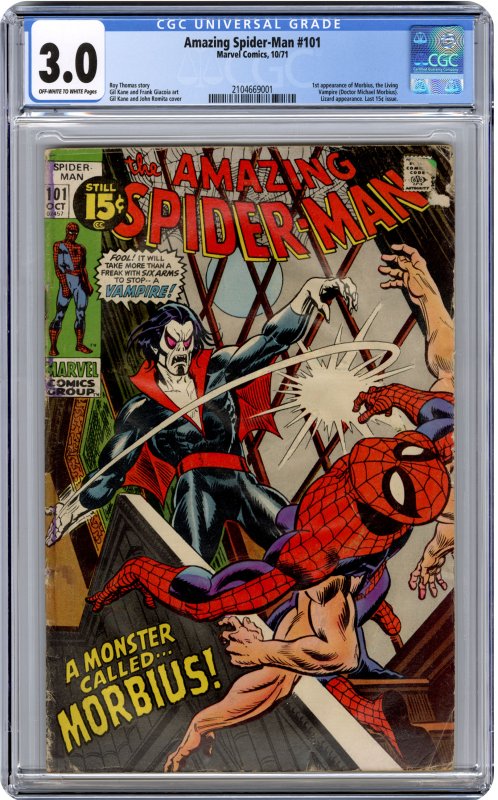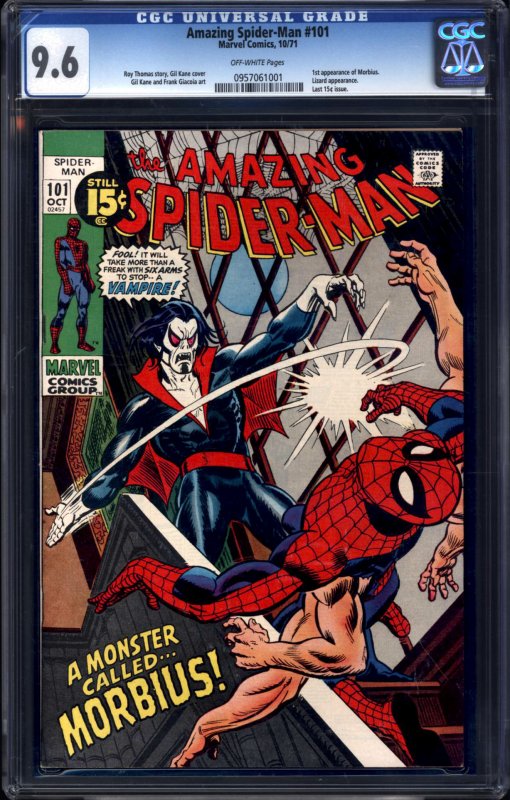AMAZING SPIDER-MAN (1963-98; 2003-13) #101
F/VF: 7.0

(Stock Image)

YES
Accepting Offers
--
Offers
PUBLISHER: Marvel
COMMENTS: glossy
1st appearance of Morbius; John Romita cover; last 15c issue; COMIC BOOK IMPACT rating of 7 (CBI)
Read Description ▼
1st appearance of Morbius; John Romita cover; last 15c issue; COMIC BOOK IMPACT rating of 7 (CBI)
DESCRIPTION
glossy
1st appearance of Morbius; John Romita cover; last 15c issue; COMIC BOOK IMPACT rating of 7 (CBI)
Marvel’s cinematic output has the power to turn a somewhat overlooked comic into a key issue overnight, simply by mentioning an upcoming project; and this book, ASM #101 is one of the lucky issues to be granted this lofty status. Back in the early 70s, the CCA lifted their ban on supernatural content in comics; for years, vampires, mummies, zombies and the like were not allowed to be featured in comics unless they were overtly benign and childish, but once moral straightjackets started loosening, Marvel was quick to jump at the chance to unleash their modern monsters upon the comic reading world.
Mere months after the ban was lifted, Roy Thomas and Gil Kane created Morbius, the Living Vampire, The book also offered the milestone of Thomas becoming the first writer besides Stan Lee to pen the book, breaking Stan's previous 100-issue streak. This first appearance features the origin story of Dr. Michael Morbius, whose vampire-like bloodlust is sparked by a science experiment gone awry. (Kane based Morbius’ look on actor Jack Palance, whose chilling demeanor is known by many a fan of cinema.) The character would go on to star in the B&W magazine Vampire Tales and continues on throughout Marvel history as a tortured antihero. The Morbius movie with Oscar-winner Jared Leto helped to drive prices of this book into the upper echelons of Bronze Age titles. Now is the time to invest in this popular and accessible key.
Artists Information
Frank Giacoia (July 6, 1924 – February 4, 1988) was an American comics artist known primarily as an inker. He sometimes worked under the name Frank Ray, Giacoia made the rounds to almost every Golden Age publisher, notably working on Flash and Batman stories, he also worked at Timely during this period. In the Silver Age Frank worked on many Jack Kirby pages, particularly in Captain America, and he also notably inked the first appearance of the Punisher in AMS #129.
Gil Kane was a Latvian-born American comics artist whose career spanned the 1940s to the 1990s and virtually every major comics company and character. Kane co-created the modern-day versions of the superheroes Green Lantern and the Atom for DC Comics, and co-created Iron Fist with Roy Thomas for Marvel Comics. He was involved in such major storylines as that of The Amazing Spider-Man #96–98, which, at the behest of the U.S. Department of Health, Education, and Welfare, bucked the then-prevalent Comics Code Authority to depict drug abuse, and ultimately spurred an update of the Code. Kane additionally pioneered an early graphic novel prototype, His Name Is... Savage, in 1968, and a seminal graphic novel, Blackmark, in 1971. In 1997, he was inducted into both the Will Eisner Comic Book Hall of Fame and the Harvey Award Jack Kirby Hall of Fame.
John Romita was one of the driving forces behind Marvel's Silver Age, first taking up the reins on Amazing Spider-Man following the departure of Steve Ditko with issue #38. Romita's long run on Spider-Man would include the introduction of classic characters such as Mary Jane Watson, the Kingpin and many others. He would be a major contributor to the entire Marvel line throughout the 1970s — including designing the look of The Punisher. Romita's influence has since been felt for decades, including the emergence of John Romita, Jr. as one of the industry's top illustrators.
1st appearance of Morbius; John Romita cover; last 15c issue; COMIC BOOK IMPACT rating of 7 (CBI)
Marvel’s cinematic output has the power to turn a somewhat overlooked comic into a key issue overnight, simply by mentioning an upcoming project; and this book, ASM #101 is one of the lucky issues to be granted this lofty status. Back in the early 70s, the CCA lifted their ban on supernatural content in comics; for years, vampires, mummies, zombies and the like were not allowed to be featured in comics unless they were overtly benign and childish, but once moral straightjackets started loosening, Marvel was quick to jump at the chance to unleash their modern monsters upon the comic reading world.
Mere months after the ban was lifted, Roy Thomas and Gil Kane created Morbius, the Living Vampire, The book also offered the milestone of Thomas becoming the first writer besides Stan Lee to pen the book, breaking Stan's previous 100-issue streak. This first appearance features the origin story of Dr. Michael Morbius, whose vampire-like bloodlust is sparked by a science experiment gone awry. (Kane based Morbius’ look on actor Jack Palance, whose chilling demeanor is known by many a fan of cinema.) The character would go on to star in the B&W magazine Vampire Tales and continues on throughout Marvel history as a tortured antihero. The Morbius movie with Oscar-winner Jared Leto helped to drive prices of this book into the upper echelons of Bronze Age titles. Now is the time to invest in this popular and accessible key.
Artists Information
Frank Giacoia (July 6, 1924 – February 4, 1988) was an American comics artist known primarily as an inker. He sometimes worked under the name Frank Ray, Giacoia made the rounds to almost every Golden Age publisher, notably working on Flash and Batman stories, he also worked at Timely during this period. In the Silver Age Frank worked on many Jack Kirby pages, particularly in Captain America, and he also notably inked the first appearance of the Punisher in AMS #129.
Gil Kane was a Latvian-born American comics artist whose career spanned the 1940s to the 1990s and virtually every major comics company and character. Kane co-created the modern-day versions of the superheroes Green Lantern and the Atom for DC Comics, and co-created Iron Fist with Roy Thomas for Marvel Comics. He was involved in such major storylines as that of The Amazing Spider-Man #96–98, which, at the behest of the U.S. Department of Health, Education, and Welfare, bucked the then-prevalent Comics Code Authority to depict drug abuse, and ultimately spurred an update of the Code. Kane additionally pioneered an early graphic novel prototype, His Name Is... Savage, in 1968, and a seminal graphic novel, Blackmark, in 1971. In 1997, he was inducted into both the Will Eisner Comic Book Hall of Fame and the Harvey Award Jack Kirby Hall of Fame.
John Romita was one of the driving forces behind Marvel's Silver Age, first taking up the reins on Amazing Spider-Man following the departure of Steve Ditko with issue #38. Romita's long run on Spider-Man would include the introduction of classic characters such as Mary Jane Watson, the Kingpin and many others. He would be a major contributor to the entire Marvel line throughout the 1970s — including designing the look of The Punisher. Romita's influence has since been felt for decades, including the emergence of John Romita, Jr. as one of the industry's top illustrators.


AMAZING SPIDER-MAN (1963-98; 2003-13) #101
Marvel CGC F/VF: 7.0
ow/white pages
1st appearance of Morbius; John Romita cover; last 15c issue; COMIC BOOK IMPACT rating of 7 (CBI)
1st appearance of Morbius; John Romita cover; last 15c issue; COMIC BOOK IMPACT rating of 7 (CBI)
ow/white pages
1st appearance of Morbius; John Romita cover; last 15c issue; COMIC BOOK IMPACT rating of 7 (CBI)
1st appearance of Morbius; John Romita cover; last 15c issue; COMIC BOOK IMPACT rating of 7 (CBI)


AMAZING SPIDER-MAN (1963-98; 2003-13) #101
Marvel CGC G/VG: 3.0
off-white pages
1st appearance of Morbius; John Romita cover; last 15c issue; COMIC BOOK IMPACT rating of 7 (CBI)
1st appearance of Morbius; John Romita cover; last 15c issue; COMIC BOOK IMPACT rating of 7 (CBI)
off-white pages
1st appearance of Morbius; John Romita cover; last 15c issue; COMIC BOOK IMPACT rating of 7 (CBI)
1st appearance of Morbius; John Romita cover; last 15c issue; COMIC BOOK IMPACT rating of 7 (CBI)


AMAZING SPIDER-MAN (1963-98; 2003-13) #101
Marvel CGC G/VG: 3.0
ow/white pages
1st appearance of Morbius; John Romita cover; last 15c issue; COMIC BOOK IMPACT rating of 7 (CBI)
1st appearance of Morbius; John Romita cover; last 15c issue; COMIC BOOK IMPACT rating of 7 (CBI)
ow/white pages
1st appearance of Morbius; John Romita cover; last 15c issue; COMIC BOOK IMPACT rating of 7 (CBI)
1st appearance of Morbius; John Romita cover; last 15c issue; COMIC BOOK IMPACT rating of 7 (CBI)





1st appearance of Morbius; John Romita cover; last 15c issue; COMIC BOOK IMPACT rating of 7 (CBI)
1st appearance of Morbius; John Romita cover; last 15c issue; COMIC BOOK IMPACT rating of 7 (CBI)